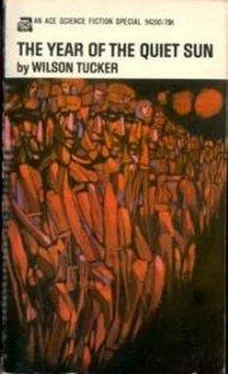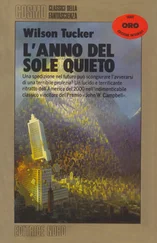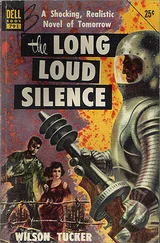Wilson Tucker - The Year of the Quiet Sun
Здесь есть возможность читать онлайн «Wilson Tucker - The Year of the Quiet Sun» весь текст электронной книги совершенно бесплатно (целиком полную версию без сокращений). В некоторых случаях можно слушать аудио, скачать через торрент в формате fb2 и присутствует краткое содержание. Год выпуска: 1970, ISBN: 1970, Издательство: Ace Books, Жанр: Фантастика и фэнтези, на английском языке. Описание произведения, (предисловие) а так же отзывы посетителей доступны на портале библиотеки ЛибКат.
- Название:The Year of the Quiet Sun
- Автор:
- Издательство:Ace Books
- Жанр:
- Год:1970
- ISBN:0-441-94201-6
- Рейтинг книги:3 / 5. Голосов: 1
-
Избранное:Добавить в избранное
- Отзывы:
-
Ваша оценка:
- 60
- 1
- 2
- 3
- 4
- 5
The Year of the Quiet Sun: краткое содержание, описание и аннотация
Предлагаем к чтению аннотацию, описание, краткое содержание или предисловие (зависит от того, что написал сам автор книги «The Year of the Quiet Sun»). Если вы не нашли необходимую информацию о книге — напишите в комментариях, мы постараемся отыскать её.
Won retrospective John W. Campbell Memorial Award in 1976.
Nominated for Nebula Award for Best Novel in 1970.
Nominated for Hugo Award for Best Novel in 1971.
The Year of the Quiet Sun — читать онлайн бесплатно полную книгу (весь текст) целиком
Ниже представлен текст книги, разбитый по страницам. Система сохранения места последней прочитанной страницы, позволяет с удобством читать онлайн бесплатно книгу «The Year of the Quiet Sun», без необходимости каждый раз заново искать на чём Вы остановились. Поставьте закладку, и сможете в любой момент перейти на страницу, на которой закончили чтение.
Интервал:
Закладка:
He left quickly, bearing north and west. The far corner was a mile or more away as he remembered the map of the station, but he thought he could walk the distance in a reasonable time.
Chaney found the motor pool before he’d progressed a half dozen long blocks. Less than twenty cars littered the great blacktopped lot, but not one was operable: they had been wantonly stripped of parts and many of them were no more than burned-out shells. The hood of every vehicle was propped open, and the batteries taken; not one of the small motors was left intact to provide him with an idea of the plant. Chaney poked about the lot because he was curious, and because Arthur Saltus had told him about the little electric cars. He wished he could drive one. There were no trucks on the lot nor had he seen one anywhere on the station, although a number of them had been working the post during his training period. He supposed they had been transferred to Chicago to meet the emergency — or had been stolen when the ramjets overran the station.
Chaney emerged from the lot and stopped abruptly on the street. It may have been an illusion brought on by tension, but he thought he glimpsed movement in the high grass across the street. He slipped the safety on the rifle and walked to the curb. Nothing was visible in the heavy undergrowth.
There were no holes in the fence at the corner.
The burned and rusted shell of a truck occupied a place that had once been a hole, but now that truck was a part of the repaired fence. Barbed wire had been strung back and forth across the opening, pulled taut over, under, and through the wreck itself in such fashion that the truck became an integral part of the barrier; yet other strands of wire were laced vertically through the fencing, making it impossible for even a small boy to crawl through. He went along the fence to examine the second hole. It had been repaired and rebuilt in as thorough a manner as the first, and an old cavity in the ground had been filled in. The barricade was intact, impenetrable.
Everywhere the weeds and grass grew tall, actually concealing the lower third of the fence from a man standing only a few feet away. Chaney was not surprised to find the same gruesome talismans guarding the northwest corner; he had expected to find them. The skeletal owners of the skulls were missing, but nowhere on the station had he seen a human body — someone had buried them all, friend and foe alike. The three skulls hung at the top of the fencing, glaring down at the plain below and at the rusted railroad beyond.
Chaney turned away.
He prowled through the high grass, looking for anything. Arthur Saltus had found no trace of the Major but yet Chaney could not help himself; he searched for any trifle that would indicate the man’s presence on the scene. It was impossible to give up Major Moresby without some effort, some attempt to place him there.
From somewhere in the distance the shrill, playful shout of a child pierced the morning.
Chaney jumped with astonishment and nearly lost his footing on a chunk of metal buried in the grass. He turned quickly to scan the corner of the station he thought empty, then searched backward over the route he’d traveled from the motor pool. The child was heard again — and then a woman’s voice calling to it. Behind him. Down the slope. Chaney felt an eager, mounting excitement as he spun about and ran to the fence. They were out there beyond the fence.
He found them at once: a man, a woman, and a child of three or four years, trudging along the railway tracks in the middle distance. The man was carrying nothing but a stout stick or club, while the woman was toting a bag. The youngster ran along behind them, playing some game of his own devising.
Chaney was so glad to see them he forgot his own danger and yelled at the top of his voice. The rifle was a burden and he dropped it, to wave both hands.
Ignoring the barbed wire, he climbed part way up the fence to show himself and gain their attention. He shouted again, and beckoned them to come toward him.
The result left him utterly dumbfounded.
The adult members of the family looked around with some surprise, stared up and down the tracks, across fields, and discovered him at last clinging to the fence alongside the talismans. They stood motionless, frozen by fear, for only a tick in time. The woman cried out as though in pain and dropped the bag; she ran to protect the child. The man sprinted after her — passed her — and caught up the child in a quick scooping motion. The stick fell from his hands. He turned only once to stare at Chaney hanging on the fence and then raced away along the tracks. The woman stumbled — nearly fell — then ran desperately to keep pace with the man. The father shifted his small burden to one shoulder, then used his free hand to help the woman — urging her, hurrying her. They ran from him with all the speed and strength they possessed, the child now crying with consternation. Fear ran with them.
“Come back!”
He clung to the prickly fence and watched them out of sight. The billboard and high grasses hid them, shut them off, and the childish crying was hushed. Chaney hung there, his fingers curling through the holes of the fencing.
“Please come back!”
The northwest corner of the world stayed empty. He climbed down from the fence with bloodied hands.
Chaney picked up the rifle and turned away, plowing a path through the weeds and grass toward the distant road and the cluster of buildings at the heart of the station. He lacked the courage to look back. He had never known anyone to run from him — not even those beggar children who had squatted on the sands of the Negev and watched him pry into the sands of their forgotten history. They were timid and mistrustful, those Bedouin, but they hadn’t run from him. He walked back without pause, refusing to look again at the stripped automobiles, the recreation area with its pool-sized midden, the burned out barracks and the attending wildflowers — refusing to look at any of it, not wanting to see anything more of the world that had been or the new one discovered today. He walked with the taste of wormwood in his mouth.
Elwood Station was an enclosed world, a fenced and fright-inducing world standing like an island of dogged isolation amid the survivors of that violent civil war. There were survivors. They were out there on the outside and they had fled from him — on the inside. Their fears centered on the station: here was the devil they knew. He was the devil they’d glimpsed.
But the station had a resident — not a visitor, not a raider from beyond the fence who plundered the stores in the wintertime, but a permanent resident. A resident devil who had repaired the fence and hung out the talismans to keep the survivors away, a resident christian who had dug a grave and erected a cross above it.
Chaney stood in the middle of the parking lot.
Before him: the impenetrable walls of the laboratory stood out like a great gray temple in a field of weeds. Before him: a mound of yellow clay heaped beside the Nabataean cistern stood out like an anachronistic thumb, with a single grave hard by. Before him: a two-wheeled cart made of reclaimed lumber and borrowed wheels.
Somewhere behind him: a pair of eyes watching.
SIXTEEN
Brian Chaney took the keys from his pocket and unlocked the operations door. Two lanterns rested on the top step, but no bells rang below as the door swung. A rush of clammy air fell through the doorway to be lost in the crisp, cleaner air outside. The sun rode high — near the zenith — but the day stayed chilly with little promise of becoming warmer. Chaney was thankful for the heavy coat he wore.
Quiet sun, clean sky, unseasonably cold weather: he could report that to Gilbert Seabrooke.
Читать дальшеИнтервал:
Закладка:
Похожие книги на «The Year of the Quiet Sun»
Представляем Вашему вниманию похожие книги на «The Year of the Quiet Sun» списком для выбора. Мы отобрали схожую по названию и смыслу литературу в надежде предоставить читателям больше вариантов отыскать новые, интересные, ещё непрочитанные произведения.
Обсуждение, отзывы о книге «The Year of the Quiet Sun» и просто собственные мнения читателей. Оставьте ваши комментарии, напишите, что Вы думаете о произведении, его смысле или главных героях. Укажите что конкретно понравилось, а что нет, и почему Вы так считаете.












